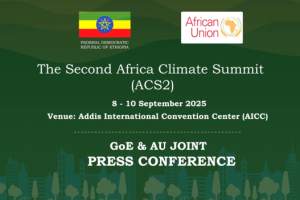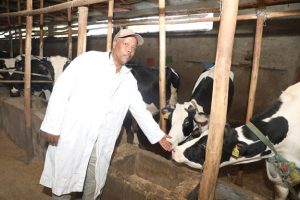BY DARGIE KAHSAY
This week, on monday, the Intergovernmental Panel on Climate Change (IPCC), United Nation’s body for assessing the science related to climate change, report on climate change reported that the world is experiencing rapid and widespread changes in very region and across the whole climate system.
IPCC report indicated that the Earth has already warmed by 1.1 degree Celsius since the 19th century and predicted Earth’s warming to more than 1.5 degree Celsius within the next two decades. According to the report the Earth’s rapid warming may lead to more frequent heat waves, droughts, and extreme weather.
The observed changes in the Earth are unprecedented in thousands of years; the report underlined adding unless there are immediate, rapid and large-scale reductions in greenhouse gas emissions, Earth’s warming may pass 1.5 degree Celsius within short decades.
According to IPCC report Africa is vulnerable to the extreme weather in the coming years adding temperatures and hot extremes have emerged above natural variability in all land regions of the continent.
In Africa, the report stressed, the rate of surface temperature increase has generally more rapid than the global average, with human-induced climate change being the dominant factor in the continent. The report with high confidence underlined that increase in hot extremes and decrease in cold extremes is projected to continue in the continent throughout the 21st century with additional global warming.
In addition, marine heat waves are projected to increase in the continent. The report also reported that sea level has increased during the past three decades in the continent due to climate change and is certainly projected to continue in the continent, contributing to increases in the frequency and severity of coastal flooding in low-lying areas to coastal erosion and along most sandy coasts.
Intergovernmental Panel on Climate Change (IPCC vice-chair Youba Sokona told Africa News that Africa in general is vulnerable to the projected rapid and widespread climate change. “The entire continent is highly exposed to climate extremes, at a relatively high level of vulnerability, which amplifies the problems that the continent is experiencing, including poverty, limited infrastructure, conflicts and urbanization in development,” Youba Sokona stated.
The IPCC 2021 climate change reported and projected Africa’s climate change by dividing the continent in to nine sub-regions. Of the nine sub-regions, IPCC reported that an increase in extreme rainfall was observed in western and eastern southern sub-regions of the continent while the other seven sub-regions had available limited data. In addition, the report stated that less than half of the sub-regions provided sufficient data to evaluate the rates of drought.
Approached by The Ethiopian Herald, Global Youth Climate Leader from Ethiopia and founder of The Youth Print, Yared Abera stated that IPCC is a scientific community established to guide climate change since climate change is both a scientific and social issue. Yared added that during its special report during October 2020, IPCC strongly issued that the world has to be limited the carbon emission to 1.5 degree Celsius.
The current report of IPCC base is physical stance of the environment which is released after the 54th session of the scientific panel and its main theme is related to drought. During the past reports, IPCC recommended for the limit of carbon emission to 1.5 degree Celsius before 2030, but according to current assessments, the reduction is likely to pass 2040.
According to the current IPCC report to protect the world’s rapid climate change, this report strongly recommended that the world should decline the carbon emission to zero before 2050. Unless, timely actions are being taken, physical damages and impacts due to climate change would become worsened, the physical assessment of the scientists argued, he stated.
According to Yared, physical assessments of IPCC so far were focused only on agricultural and ecological droughts, but currently following the questions from Africa and other states, the physical assessment considers meteorological and hydrological droughts.
Currently unexpected and uncertain droughts due to meteorology and hydrology are becoming among the problems which lead for physical impacts.
The environment activist noted that the current report of IPCC is very helpful for the future carbon emission as long as the climate change remains a big and serious challenge for our planet. Hence, countries of the world collectively and unilaterally are expected to take serious and timely actions especially in carbon emission and taking other necessary measures to contribute for the adaptation. Strong policies and implementations are expected at the global level to prevent the rapid global warming, according to Yared.
Yared stated that since the report indicated that global warming is rapidly widespread at all regions of the world, directly and indirectly, it has multidimensional impact on the developing world. For him, according to the physical assessment report of the IPCC, due to the intensifying climate change, droughts are highly anticipated unless timely actions are being taken. Climate change driven droughts have direct effects to the developing world whose main source of income is agriculture, which depends mostly on natural rainfall.
“When we come to Africa and other developing countries,” Yared said “though they contribute low carbon emission, they are among the top vulnerable compared to the developed world.” According to Yared, to minimize the vulnerability of Africa and other developing world, the countries should develop their adaptation and mitigation measures. To improve adaptation and mitigation capacity of the developing world, he added, it is necessary to develop their capacity of access to climate finance, he added. Yared hoped that “one step could be moved on access to climate finance for the developing world during the upcoming COP26, which is planned to be held in Glasgow.”
In addition, Yared noted, due to the continued climate change, lost and damage on the developing world is highly anticipated. According to him, it is very important to develop the developing world countries management capacity disaster divined lost and damages.
As to Yared, the current report of IPCC warned the world that it is a critical time to cut the carbon emission of the world and if carbon emission decreased, he said, it is a blessing for the developing world. Not only that, he said, the report recommended that countries, developed and developing, to give a serious attention for climate take adaptation, mitigation and other measures to fulfill their respective responsibilities.
The IPCC on its report indicated that insufficient availability of data in several Africa regions creates a gap for further analysis in the continent. In This regard, Yared stated that, availability of data is very important in tackling climate change, thought well documented data remains among the main problems of the developing countries. He argued that developing countries should strengthen their data documentation in climate change, their mitigation and adaptation activities, their contribution of carbon emission and other activities.
For Yared, the current IPCC report is an interesting input for the COP 26 session planned to be held on the coming November in Glasgow, United Kingdom. “The world is expecting big decisions and actions to control the rapidly growing climate change,” Yared added.
Yared stated that during the upcoming session of the climate change, the world is highly expecting to reach a final and actionable agreements on the major issues related to climate change that was raised so far, but yet not reached an agreement.
After seeing the current IPCC report, he said, the world is waiting decision in reaching consensus on cutting carbon emission, real supports to help the adaptation capacity of developing countries, compensations for lost and damage and to reach a final agreement for the implementations of all agreed agendas on climate change from the upcoming COP session. In addition, transparent and action based promises are expected mainly from the developed world countries.
As to him, the UK is the host of COP 26 in Glasgow and “I am sure that UK will work to make a history on its land by organizing the world to reach a historic decisions in climate.”
The Ethiopian Herald August 14/2021




